Reflective Analysis of Communication in Healthcare: Gibbs' Cycle
VerifiedAdded on 2022/10/03
|8
|1354
|198
Homework Assignment
AI Summary
This assignment presents a student's application of Gibbs' Reflective Cycle to analyze a challenging communication incident in a healthcare setting. The student describes an encounter with a patient, detailing the situation, their feelings, and the outcomes. The analysis explores the experience's positive and negative aspects, identifying what went well and what could have been improved. The student reflects on their actions, considering alternative approaches and the skills needed for better handling of similar situations in the future. The assignment concludes with a reflection on the learning process and the importance of reflective practice in enhancing nursing skills and patient care. The student references relevant literature to support their analysis and provides an action plan for future interactions.
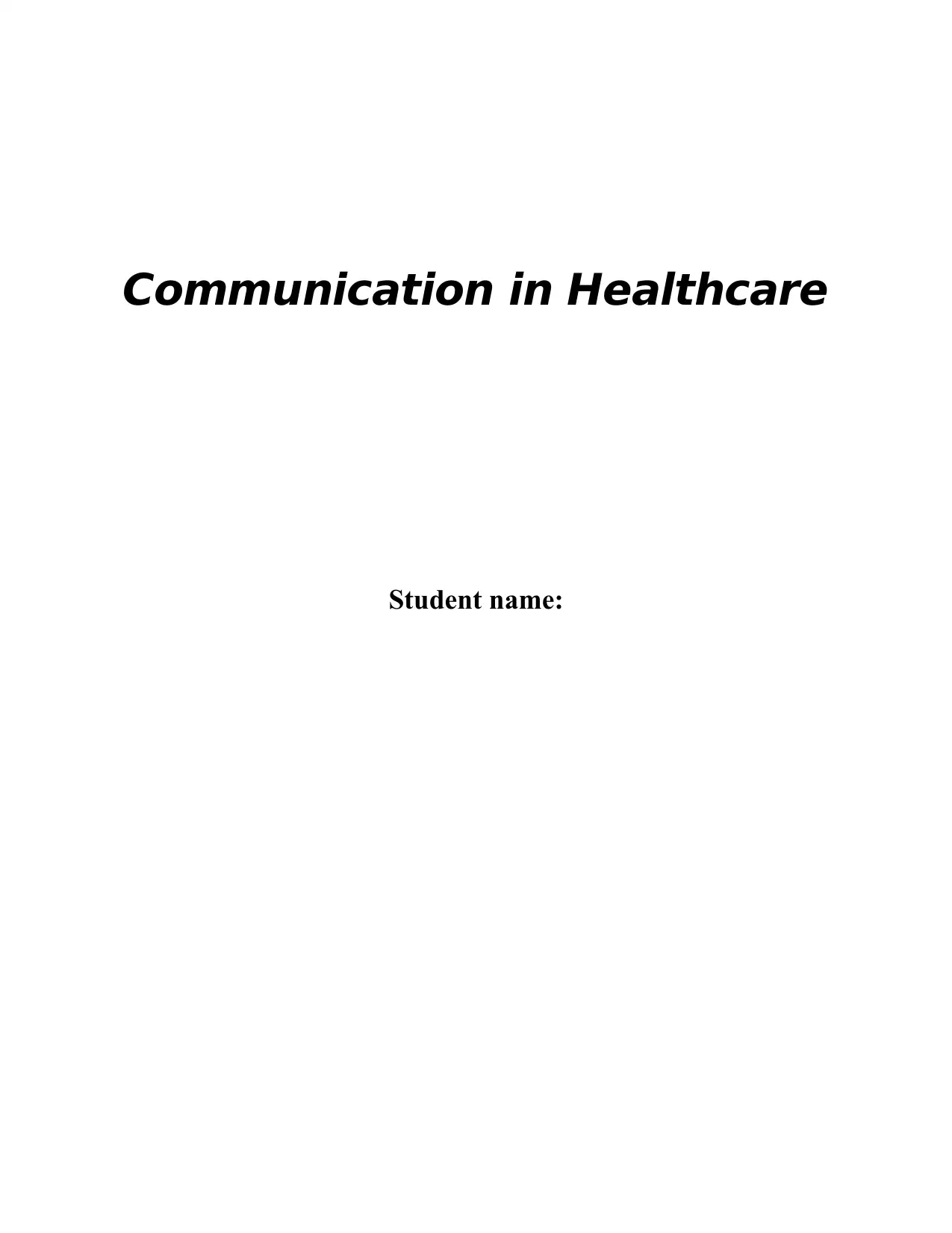
Communication in Healthcare
Student name:
Student name:
Paraphrase This Document
Need a fresh take? Get an instant paraphrase of this document with our AI Paraphraser

1
Table of Contents
Gibbs' Reflective Cycle...................................................................................................................2
References........................................................................................................................................7
Table of Contents
Gibbs' Reflective Cycle...................................................................................................................2
References........................................................................................................................................7
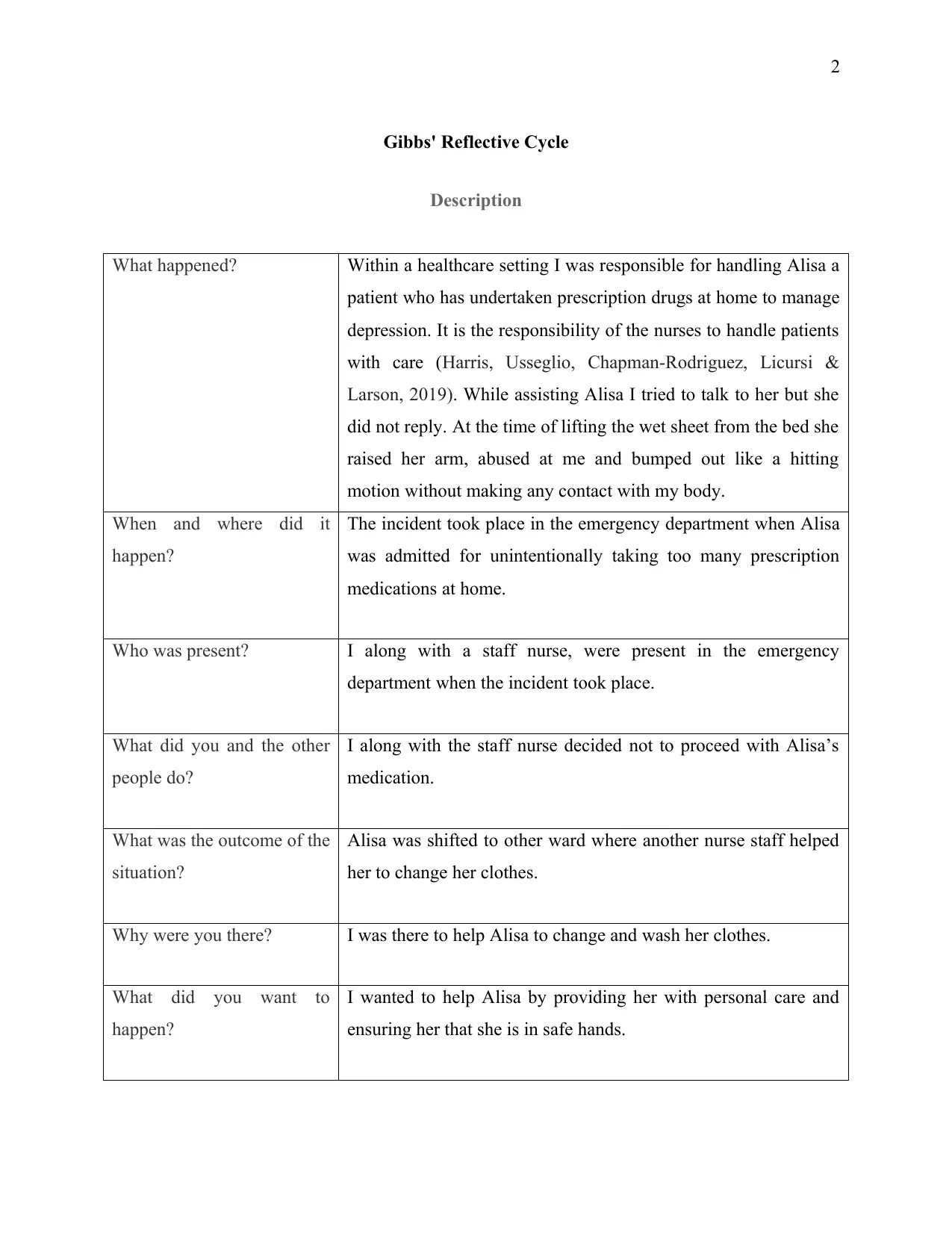
2
Gibbs' Reflective Cycle
Description
What happened? Within a healthcare setting I was responsible for handling Alisa a
patient who has undertaken prescription drugs at home to manage
depression. It is the responsibility of the nurses to handle patients
with care (Harris, Usseglio, Chapman-Rodriguez, Licursi &
Larson, 2019). While assisting Alisa I tried to talk to her but she
did not reply. At the time of lifting the wet sheet from the bed she
raised her arm, abused at me and bumped out like a hitting
motion without making any contact with my body.
When and where did it
happen?
The incident took place in the emergency department when Alisa
was admitted for unintentionally taking too many prescription
medications at home.
Who was present? I along with a staff nurse, were present in the emergency
department when the incident took place.
What did you and the other
people do?
I along with the staff nurse decided not to proceed with Alisa’s
medication.
What was the outcome of the
situation?
Alisa was shifted to other ward where another nurse staff helped
her to change her clothes.
Why were you there? I was there to help Alisa to change and wash her clothes.
What did you want to
happen?
I wanted to help Alisa by providing her with personal care and
ensuring her that she is in safe hands.
Gibbs' Reflective Cycle
Description
What happened? Within a healthcare setting I was responsible for handling Alisa a
patient who has undertaken prescription drugs at home to manage
depression. It is the responsibility of the nurses to handle patients
with care (Harris, Usseglio, Chapman-Rodriguez, Licursi &
Larson, 2019). While assisting Alisa I tried to talk to her but she
did not reply. At the time of lifting the wet sheet from the bed she
raised her arm, abused at me and bumped out like a hitting
motion without making any contact with my body.
When and where did it
happen?
The incident took place in the emergency department when Alisa
was admitted for unintentionally taking too many prescription
medications at home.
Who was present? I along with a staff nurse, were present in the emergency
department when the incident took place.
What did you and the other
people do?
I along with the staff nurse decided not to proceed with Alisa’s
medication.
What was the outcome of the
situation?
Alisa was shifted to other ward where another nurse staff helped
her to change her clothes.
Why were you there? I was there to help Alisa to change and wash her clothes.
What did you want to
happen?
I wanted to help Alisa by providing her with personal care and
ensuring her that she is in safe hands.
⊘ This is a preview!⊘
Do you want full access?
Subscribe today to unlock all pages.

Trusted by 1+ million students worldwide
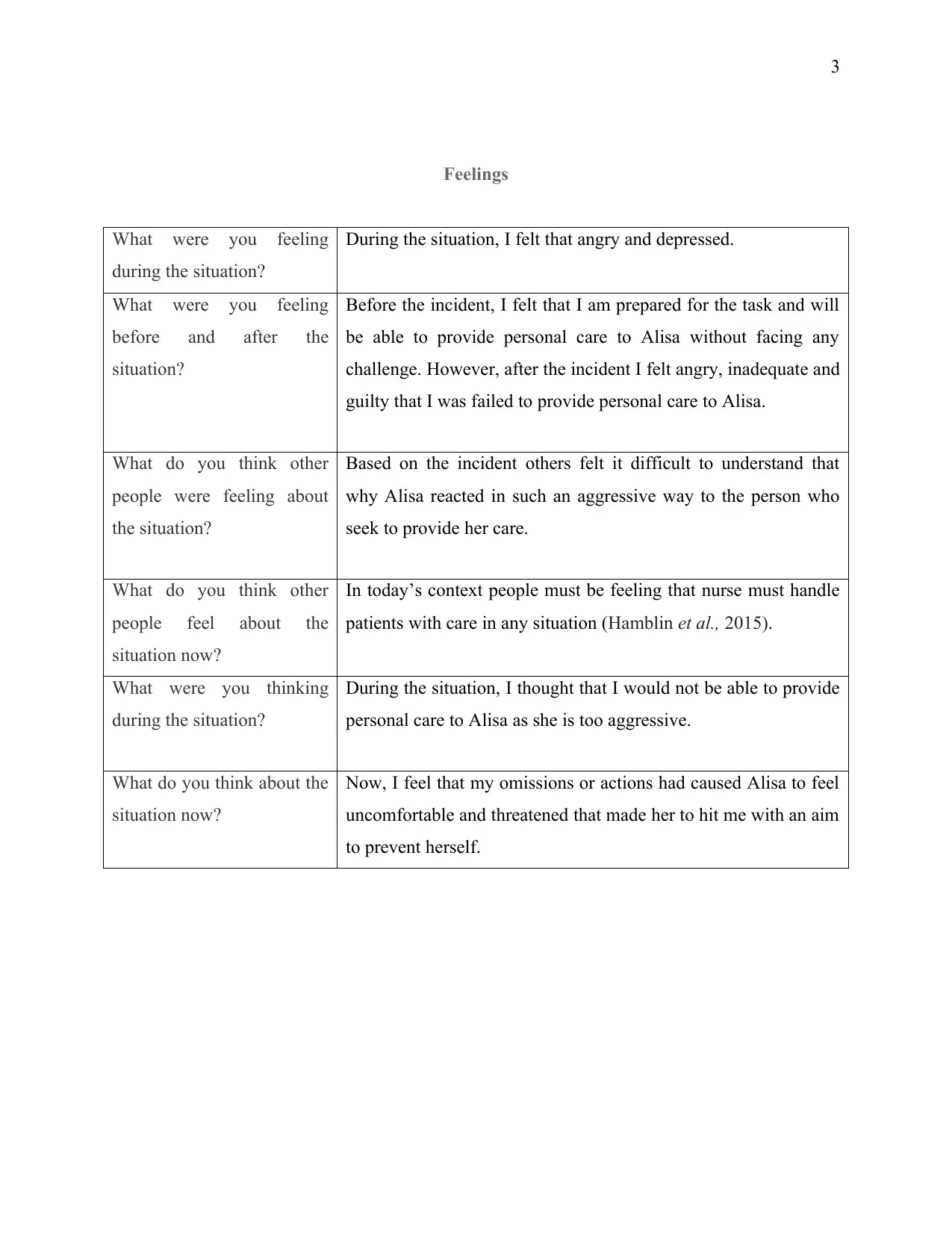
3
Feelings
What were you feeling
during the situation?
During the situation, I felt that angry and depressed.
What were you feeling
before and after the
situation?
Before the incident, I felt that I am prepared for the task and will
be able to provide personal care to Alisa without facing any
challenge. However, after the incident I felt angry, inadequate and
guilty that I was failed to provide personal care to Alisa.
What do you think other
people were feeling about
the situation?
Based on the incident others felt it difficult to understand that
why Alisa reacted in such an aggressive way to the person who
seek to provide her care.
What do you think other
people feel about the
situation now?
In today’s context people must be feeling that nurse must handle
patients with care in any situation (Hamblin et al., 2015).
What were you thinking
during the situation?
During the situation, I thought that I would not be able to provide
personal care to Alisa as she is too aggressive.
What do you think about the
situation now?
Now, I feel that my omissions or actions had caused Alisa to feel
uncomfortable and threatened that made her to hit me with an aim
to prevent herself.
Feelings
What were you feeling
during the situation?
During the situation, I felt that angry and depressed.
What were you feeling
before and after the
situation?
Before the incident, I felt that I am prepared for the task and will
be able to provide personal care to Alisa without facing any
challenge. However, after the incident I felt angry, inadequate and
guilty that I was failed to provide personal care to Alisa.
What do you think other
people were feeling about
the situation?
Based on the incident others felt it difficult to understand that
why Alisa reacted in such an aggressive way to the person who
seek to provide her care.
What do you think other
people feel about the
situation now?
In today’s context people must be feeling that nurse must handle
patients with care in any situation (Hamblin et al., 2015).
What were you thinking
during the situation?
During the situation, I thought that I would not be able to provide
personal care to Alisa as she is too aggressive.
What do you think about the
situation now?
Now, I feel that my omissions or actions had caused Alisa to feel
uncomfortable and threatened that made her to hit me with an aim
to prevent herself.
Paraphrase This Document
Need a fresh take? Get an instant paraphrase of this document with our AI Paraphraser
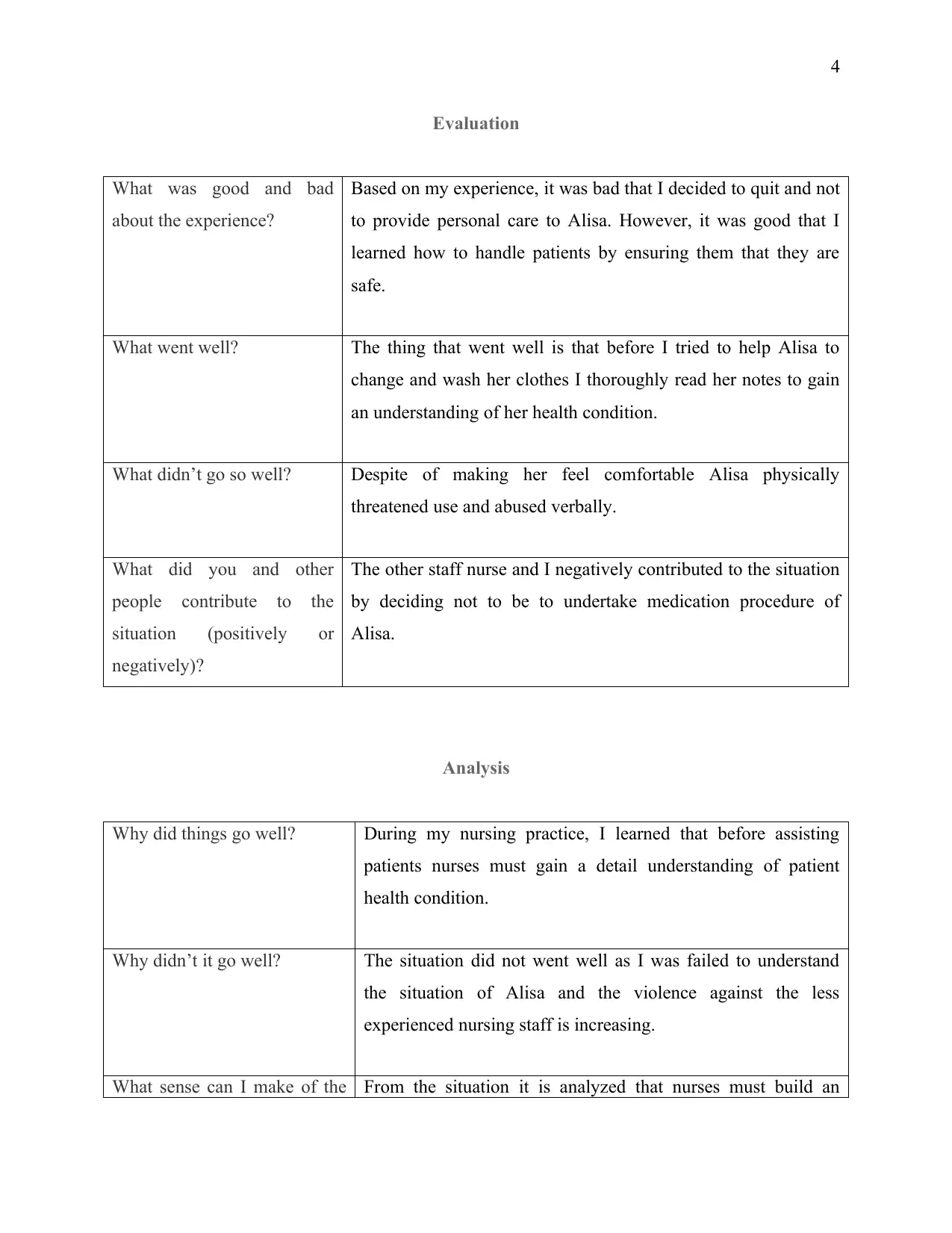
4
Evaluation
What was good and bad
about the experience?
Based on my experience, it was bad that I decided to quit and not
to provide personal care to Alisa. However, it was good that I
learned how to handle patients by ensuring them that they are
safe.
What went well? The thing that went well is that before I tried to help Alisa to
change and wash her clothes I thoroughly read her notes to gain
an understanding of her health condition.
What didn’t go so well? Despite of making her feel comfortable Alisa physically
threatened use and abused verbally.
What did you and other
people contribute to the
situation (positively or
negatively)?
The other staff nurse and I negatively contributed to the situation
by deciding not to be to undertake medication procedure of
Alisa.
Analysis
Why did things go well? During my nursing practice, I learned that before assisting
patients nurses must gain a detail understanding of patient
health condition.
Why didn’t it go well? The situation did not went well as I was failed to understand
the situation of Alisa and the violence against the less
experienced nursing staff is increasing.
What sense can I make of the From the situation it is analyzed that nurses must build an
Evaluation
What was good and bad
about the experience?
Based on my experience, it was bad that I decided to quit and not
to provide personal care to Alisa. However, it was good that I
learned how to handle patients by ensuring them that they are
safe.
What went well? The thing that went well is that before I tried to help Alisa to
change and wash her clothes I thoroughly read her notes to gain
an understanding of her health condition.
What didn’t go so well? Despite of making her feel comfortable Alisa physically
threatened use and abused verbally.
What did you and other
people contribute to the
situation (positively or
negatively)?
The other staff nurse and I negatively contributed to the situation
by deciding not to be to undertake medication procedure of
Alisa.
Analysis
Why did things go well? During my nursing practice, I learned that before assisting
patients nurses must gain a detail understanding of patient
health condition.
Why didn’t it go well? The situation did not went well as I was failed to understand
the situation of Alisa and the violence against the less
experienced nursing staff is increasing.
What sense can I make of the From the situation it is analyzed that nurses must build an
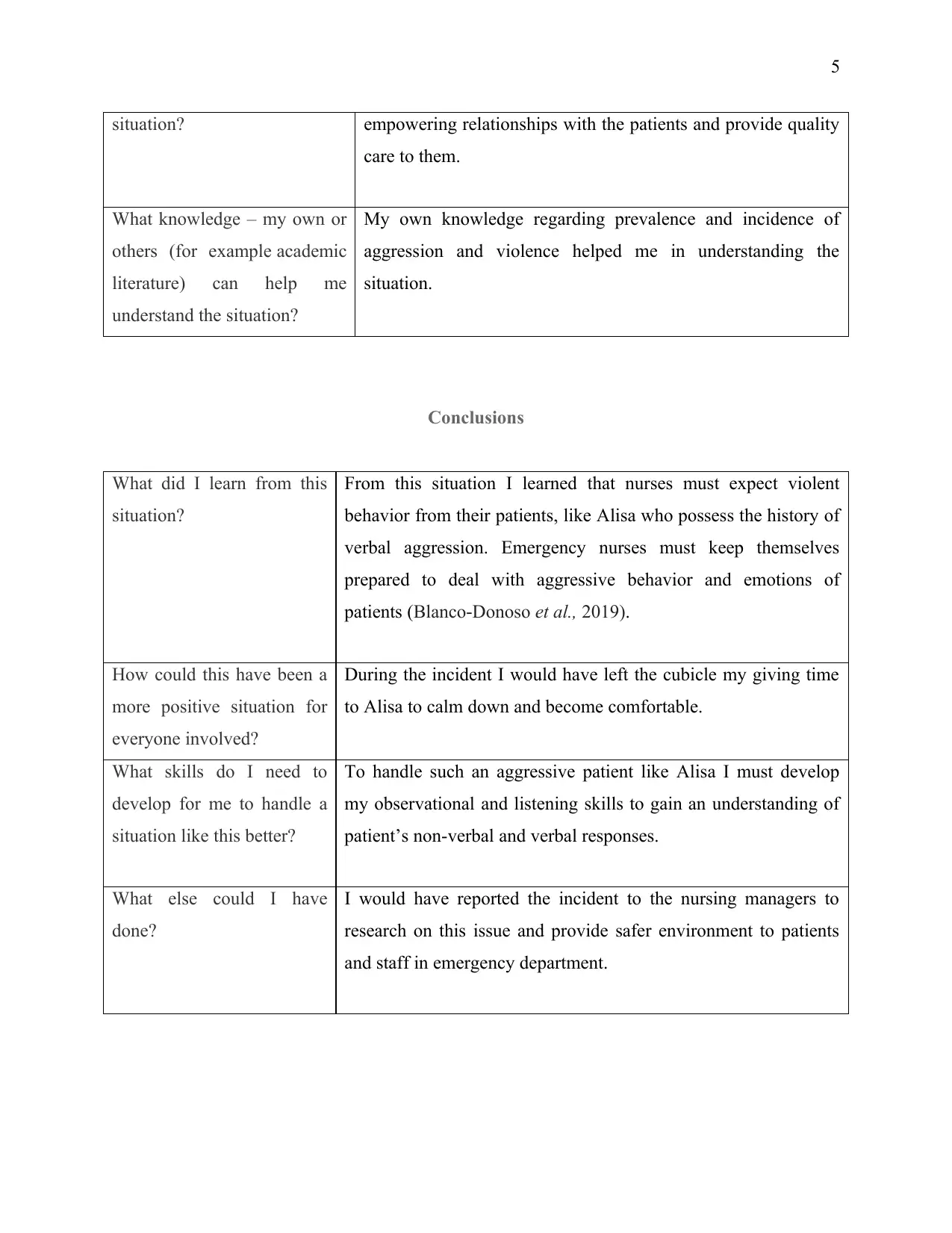
5
situation? empowering relationships with the patients and provide quality
care to them.
What knowledge – my own or
others (for example academic
literature) can help me
understand the situation?
My own knowledge regarding prevalence and incidence of
aggression and violence helped me in understanding the
situation.
Conclusions
What did I learn from this
situation?
From this situation I learned that nurses must expect violent
behavior from their patients, like Alisa who possess the history of
verbal aggression. Emergency nurses must keep themselves
prepared to deal with aggressive behavior and emotions of
patients (Blanco Donoso‐ et al., 2019).
How could this have been a
more positive situation for
everyone involved?
During the incident I would have left the cubicle my giving time
to Alisa to calm down and become comfortable.
What skills do I need to
develop for me to handle a
situation like this better?
To handle such an aggressive patient like Alisa I must develop
my observational and listening skills to gain an understanding of
patient’s non-verbal and verbal responses.
What else could I have
done?
I would have reported the incident to the nursing managers to
research on this issue and provide safer environment to patients
and staff in emergency department.
situation? empowering relationships with the patients and provide quality
care to them.
What knowledge – my own or
others (for example academic
literature) can help me
understand the situation?
My own knowledge regarding prevalence and incidence of
aggression and violence helped me in understanding the
situation.
Conclusions
What did I learn from this
situation?
From this situation I learned that nurses must expect violent
behavior from their patients, like Alisa who possess the history of
verbal aggression. Emergency nurses must keep themselves
prepared to deal with aggressive behavior and emotions of
patients (Blanco Donoso‐ et al., 2019).
How could this have been a
more positive situation for
everyone involved?
During the incident I would have left the cubicle my giving time
to Alisa to calm down and become comfortable.
What skills do I need to
develop for me to handle a
situation like this better?
To handle such an aggressive patient like Alisa I must develop
my observational and listening skills to gain an understanding of
patient’s non-verbal and verbal responses.
What else could I have
done?
I would have reported the incident to the nursing managers to
research on this issue and provide safer environment to patients
and staff in emergency department.
⊘ This is a preview!⊘
Do you want full access?
Subscribe today to unlock all pages.

Trusted by 1+ million students worldwide
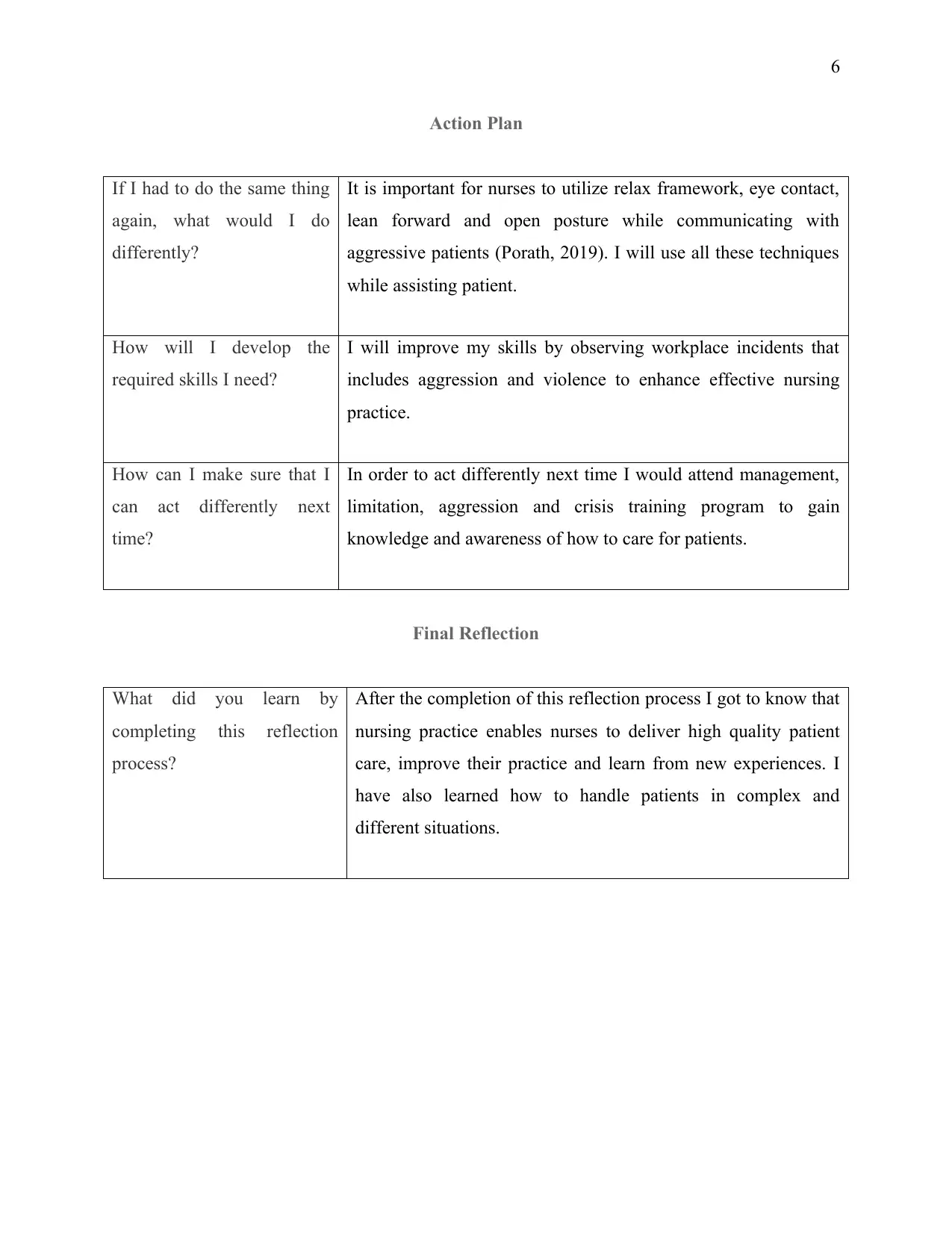
6
Action Plan
If I had to do the same thing
again, what would I do
differently?
It is important for nurses to utilize relax framework, eye contact,
lean forward and open posture while communicating with
aggressive patients (Porath, 2019). I will use all these techniques
while assisting patient.
How will I develop the
required skills I need?
I will improve my skills by observing workplace incidents that
includes aggression and violence to enhance effective nursing
practice.
How can I make sure that I
can act differently next
time?
In order to act differently next time I would attend management,
limitation, aggression and crisis training program to gain
knowledge and awareness of how to care for patients.
Final Reflection
What did you learn by
completing this reflection
process?
After the completion of this reflection process I got to know that
nursing practice enables nurses to deliver high quality patient
care, improve their practice and learn from new experiences. I
have also learned how to handle patients in complex and
different situations.
Action Plan
If I had to do the same thing
again, what would I do
differently?
It is important for nurses to utilize relax framework, eye contact,
lean forward and open posture while communicating with
aggressive patients (Porath, 2019). I will use all these techniques
while assisting patient.
How will I develop the
required skills I need?
I will improve my skills by observing workplace incidents that
includes aggression and violence to enhance effective nursing
practice.
How can I make sure that I
can act differently next
time?
In order to act differently next time I would attend management,
limitation, aggression and crisis training program to gain
knowledge and awareness of how to care for patients.
Final Reflection
What did you learn by
completing this reflection
process?
After the completion of this reflection process I got to know that
nursing practice enables nurses to deliver high quality patient
care, improve their practice and learn from new experiences. I
have also learned how to handle patients in complex and
different situations.
Paraphrase This Document
Need a fresh take? Get an instant paraphrase of this document with our AI Paraphraser
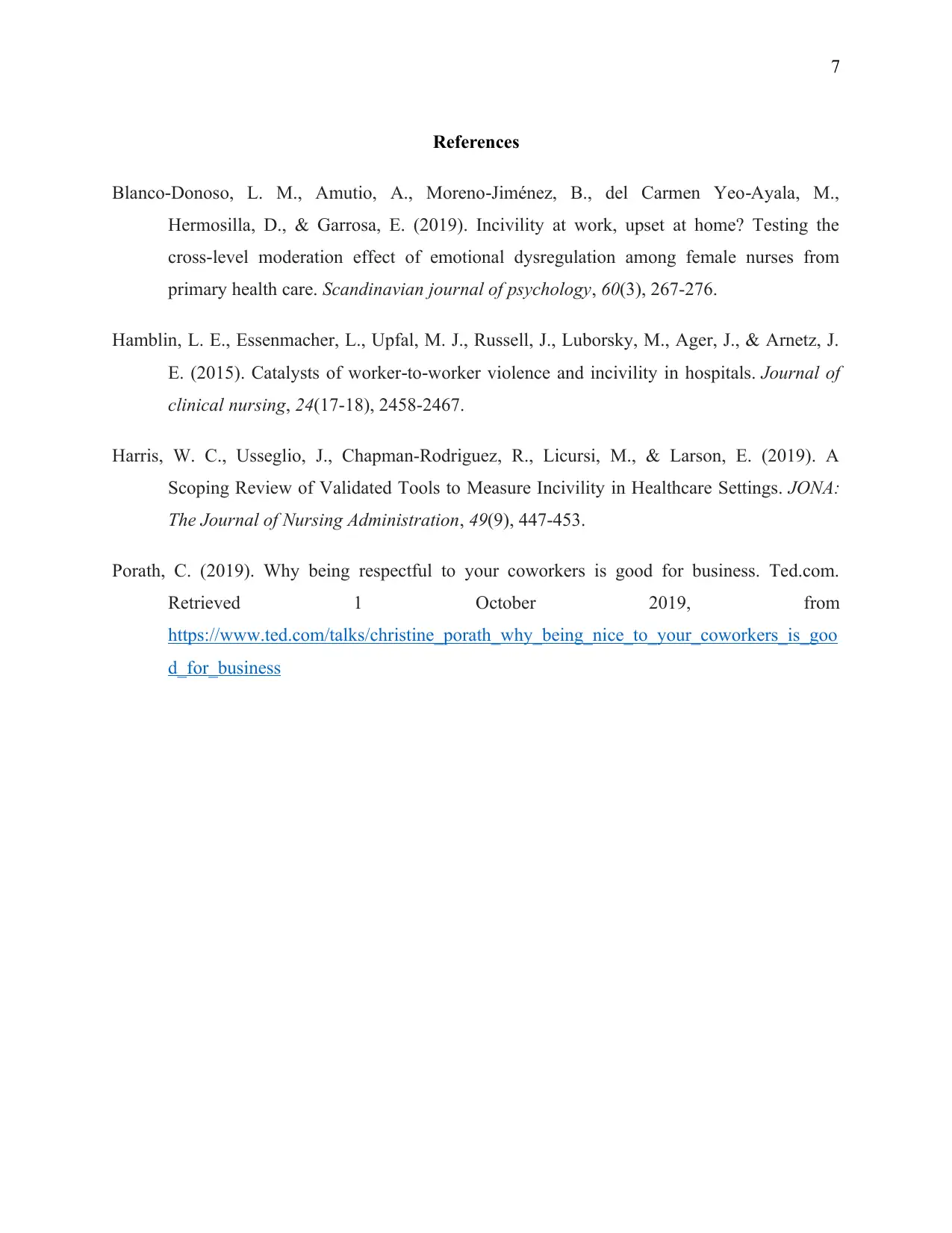
7
References
Blanco Donoso, L. M., Amutio, A., Moreno Jiménez, B., del Carmen Yeo Ayala, M.,‐ ‐ ‐
Hermosilla, D., & Garrosa, E. (2019). Incivility at work, upset at home? Testing the
cross level moderation effect of emotional dysregulation among female nurses from‐
primary health care. Scandinavian journal of psychology, 60(3), 267-276.
Hamblin, L. E., Essenmacher, L., Upfal, M. J., Russell, J., Luborsky, M., Ager, J., & Arnetz, J.
E. (2015). Catalysts of worker to worker violence and incivility in hospitals.‐ ‐ Journal of
clinical nursing, 24(17-18), 2458-2467.
Harris, W. C., Usseglio, J., Chapman-Rodriguez, R., Licursi, M., & Larson, E. (2019). A
Scoping Review of Validated Tools to Measure Incivility in Healthcare Settings. JONA:
The Journal of Nursing Administration, 49(9), 447-453.
Porath, C. (2019). Why being respectful to your coworkers is good for business. Ted.com.
Retrieved 1 October 2019, from
https://www.ted.com/talks/christine_porath_why_being_nice_to_your_coworkers_is_goo
d_for_business
References
Blanco Donoso, L. M., Amutio, A., Moreno Jiménez, B., del Carmen Yeo Ayala, M.,‐ ‐ ‐
Hermosilla, D., & Garrosa, E. (2019). Incivility at work, upset at home? Testing the
cross level moderation effect of emotional dysregulation among female nurses from‐
primary health care. Scandinavian journal of psychology, 60(3), 267-276.
Hamblin, L. E., Essenmacher, L., Upfal, M. J., Russell, J., Luborsky, M., Ager, J., & Arnetz, J.
E. (2015). Catalysts of worker to worker violence and incivility in hospitals.‐ ‐ Journal of
clinical nursing, 24(17-18), 2458-2467.
Harris, W. C., Usseglio, J., Chapman-Rodriguez, R., Licursi, M., & Larson, E. (2019). A
Scoping Review of Validated Tools to Measure Incivility in Healthcare Settings. JONA:
The Journal of Nursing Administration, 49(9), 447-453.
Porath, C. (2019). Why being respectful to your coworkers is good for business. Ted.com.
Retrieved 1 October 2019, from
https://www.ted.com/talks/christine_porath_why_being_nice_to_your_coworkers_is_goo
d_for_business
1 out of 8
Related Documents
Your All-in-One AI-Powered Toolkit for Academic Success.
+13062052269
info@desklib.com
Available 24*7 on WhatsApp / Email
![[object Object]](/_next/static/media/star-bottom.7253800d.svg)
Unlock your academic potential
Copyright © 2020–2026 A2Z Services. All Rights Reserved. Developed and managed by ZUCOL.





